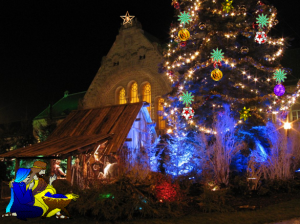CHRISTMAS DAY HOMILY – Year A
Living the Two-Fold Mission of Jesus as Children of God
(Isaiah 5:7-10; Psalm 98; Hebrews 1:1-6; John 1:1-18)
*******************************************************
What hymn, not a carol, carries the deep meaning of Christmas? The answer is “Lay Your Hands” by Carey Landry. We will see why.
Worship Jesus the Lord, Son of God, Savior and Word made flesh, and follow him into a new life of peace and joy.
 According to Corbin Eddy in his commentary, this wonderful text from the gospel of John is the climax, the summit, of the Christmas liturgy. In the earliest tradition of the celebration of Christmas in Rome, this mass on Christmas day was the Christmas Mass. This text was proclaimed – not the familiar stories of Mary and Joseph, singing angels, bustling shepherds, a moving star and traveling sages, but a profound statement of theology.
According to Corbin Eddy in his commentary, this wonderful text from the gospel of John is the climax, the summit, of the Christmas liturgy. In the earliest tradition of the celebration of Christmas in Rome, this mass on Christmas day was the Christmas Mass. This text was proclaimed – not the familiar stories of Mary and Joseph, singing angels, bustling shepherds, a moving star and traveling sages, but a profound statement of theology.
Eddy continues to state that God’s word has always been creative and re-creative of this world and all worlds. The eternal Word pre-exists the historical Jesus, but in him is fully expressive. The eternal Word speaks everywhere but in him speaks “grace upon grace” – the Way, the Truth and the Life. If Christians want to know what love is, we look at Jesus; if we want to know what real power is, we look at Jesus; if we want to know what mercy is, we look at Jesus; if we want to know what God looks like and what God wills for us, we look at Jesus. In Jesus we find the fullness of revelation.
The readings Christmas Eve presented Jesus as Messiah, Savior and Lord. Today’s readings add: Son of God, Word of God, True light, grace, truth and salvation. We are asked to worship him as all of the above.
Jesus came on a two-fold mission: to redeem and sanctify. To redeem means to save, to liberate. To sanctify means to transform, to make well, to heal, to make whole. As Messiah, as Savior, as Son of God, as truth and salvation, Jesus came to save us, to redeem us. As Lord, as Word of God, as True Light and Grace, Jesus came to heal us, to sanctify us. And that is what we celebrate at Christmas, and during this Eucharist today.
A very real analogy is the case of Louis Dubrule from Ile á-la Crosse who some years back went through the ice in a grader while making a winter road on the lake. The grader dropped straight down about forty feet. Fortunately, Louis kept his cool and did not panic. He held his breath until the cabin filled with water, opened the door and pushed himself out. The buoyancy of his water-resistant ski-doo suit lifted him to the surfaced where he popped through the broken ice. A fellow worker who had been following him in a truck managed to reach him with his jacket and pulled him out of the frigid water. He quickly transported Louis to the hospital where the staff treated him for hypothermia. They put him in a tub of cold water and slowly heated it up until he was normal again. Louis had been redeemed or saved (pulled out of the lake) and sanctified or made well (treated in the hospital). And so it must be, in a spiritual sense, for all of us.
The hymn, “Lay Your Hands” expresses this reality well through the line “May they bring your forgiveness and healing.” That is precisely what Jesus our Lord and Savior came to do, to save us through forgiveness of our sins, and to heal us through the power of his Spirit at work in our lives. We are saved through forgiveness, and healed through prayer and fellowship
The 12 Step Program of Alcoholics Anonymous is a beautiful model for us. Steps 4 & 5 involve contrition, examination of conscience, confession of sins and reception of forgiveness. That is the first part of Jesus’ mission: to redeem and to save through forgiveness. But it does not stop there. Steps 6 & 7 take us into healing, inner change and transformation of character defects. In Step 7 we humbly ask God to take away all our defects of character, to transform us. That is the second part of Jesus mission: to sanctify and to heal, to make whole.
One of our main defects of character is resentment, unforgiveness. In Matthew 18:15, Jesus teaches us how to forgive. All we have to do is be in touch with our anger and resentment (a way of loving ourselves) and then communicating those feeling to the hurtful other with love (letting go of any expectation or attempt at revenge – a way of loving those who made themselves our enemies). That is a deep healing most of the world needs.
The Eucharist is the fullness of the worship we have to offer our God. Even as we celebrate, Jesus is present, to redeem and sanctify, to save and heal us. We are then missioned to go out to the world that still lies in so much darkness, to proclaim this new way of life by our words and actions.
So today, let us truly celebrate and worship Jesus the Lord as Son of God, Savior and Word made flesh, and live as his brothers and sisters, children of God.



